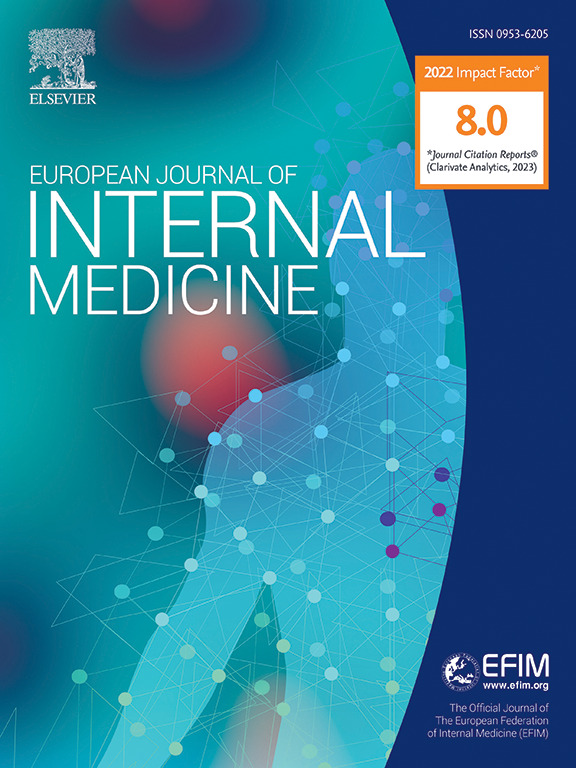Long-term secondary prevention with colchicine in patients with CAD: an updated systematic review and meta-analysis
IF 6.1
2区 医学
Q1 MEDICINE, GENERAL & INTERNAL
引用次数: 0
Abstract
The CLEAR SYNERGY trial failed to demonstrate any benefit of colchicine in patients with acute myocardial infarction (MI). In this meta-analysis of the randomized clinical trials (RCTs) of colchicine in coronary artery disease (CAD), we updated the estimates of effect on cardiovascular events in patients with CAD.
We searched for the largest RCTs of colchicine in CAD patients. The effect was assessed in a pooled analysis of individual events such as MI, urgent coronary revascularization (UR), stroke, cardiovascular mortality, and total mortality, for each of these endpoints using hazard ratios (HR) and their 95 % confidence intervals (CI), estimated by the Cox model. Fixed-effects or random-effects models were used. A similar approach was used for the composite of MI, UR, and cardiovascular mortality (MACE 1) and stroke, MI, total mortality (MACE 2). Safety was also assessed. Five studies were selected with a total of 18,656 patients. Colchicine reduced the risk of MI by 21 %, HR 0.79 (95 % CI: 0.68 - 0.92).Its effect was neutral on total and cardiovascular mortality. The composite endpoints MACE 1 and MACE 2 were reduced by colchicine, HR 0.81 (95 % CI: 0.68 - 0.98), and HR 0.88 (95 % CI: 0.79 - 0.98), respectively. There were no differences in non-cardiovascular mortality, cancer, and serious gastrointestinal and infectious events.
The benefit of colchicine appears attenuated compared to past analyses, but is still valuable in reducing the risk of MI and the composite of MI, UR, and cardiovascular death. The safety appears reassuring in relation to all serious adverse reactions.
秋水仙碱对冠心病患者的长期二级预防:一项最新的系统综述和荟萃分析。
CLEAR SYNERGY试验未能证明秋水仙碱对急性心肌梗死(MI)患者有任何益处。在这项对秋水仙碱治疗冠心病(CAD)的随机临床试验(rct)的荟萃分析中,我们更新了对冠心病患者心血管事件影响的估计。我们检索了有关秋水仙碱在CAD患者中的最大的随机对照试验。对单个事件(如心肌梗死、紧急冠状动脉血管重建术(UR)、中风、心血管死亡率和总死亡率)进行汇总分析,对每个终点使用风险比(HR)及其95%置信区间(CI),通过Cox模型估计。使用固定效应或随机效应模型。类似的方法用于心肌梗死、UR和心血管死亡率(MACE 1)和卒中、心肌梗死、总死亡率(MACE 2)的组合。安全性也进行了评估。5项研究共纳入18656例患者。秋水仙碱降低心肌梗死风险21%,风险比0.79 (95% CI: 0.68 - 0.92)。它对总死亡率和心血管死亡率的影响是中性的。秋水仙碱降低了MACE 1和MACE 2的复合终点,HR分别为0.81 (95% CI: 0.68 - 0.98)和0.88 (95% CI: 0.79 - 0.98)。在非心血管死亡率、癌症、严重胃肠道和感染事件方面没有差异。与过去的分析相比,秋水仙碱的益处似乎有所减弱,但在降低心肌梗死以及心肌梗死、尿路和心血管死亡的风险方面仍有价值。对于所有严重的不良反应,其安全性似乎令人放心。
本文章由计算机程序翻译,如有差异,请以英文原文为准。
求助全文
约1分钟内获得全文
求助全文
来源期刊
CiteScore
9.60
自引率
6.20%
发文量
364
审稿时长
20 days
期刊介绍:
The European Journal of Internal Medicine serves as the official journal of the European Federation of Internal Medicine and is the primary scientific reference for European academic and non-academic internists. It is dedicated to advancing science and practice in internal medicine across Europe. The journal publishes original articles, editorials, reviews, internal medicine flashcards, and other relevant information in the field. Both translational medicine and clinical studies are emphasized. EJIM aspires to be a leading platform for excellent clinical studies, with a focus on enhancing the quality of healthcare in European hospitals.

 求助内容:
求助内容: 应助结果提醒方式:
应助结果提醒方式:


